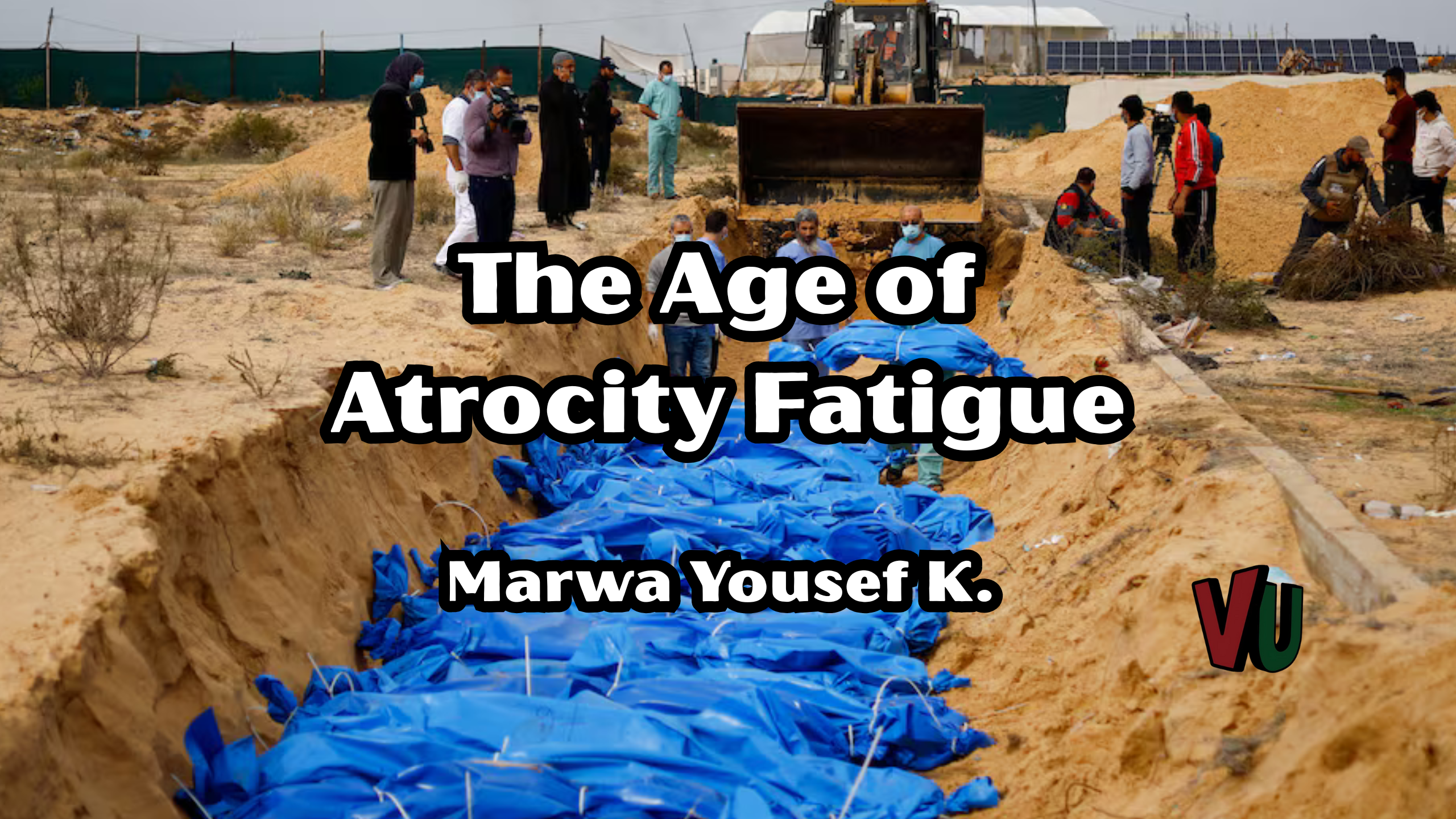
Mar Yousuf K.
Every day, we bear witness to suffering at a scale that once would have shattered us. Palestinians pull their children’s bodies from the rubble with their bare hands. Sudan bleeds to death in silence. Kashmir remains under occupation, its terrain filled with unidentified graves. Congo is being mined to death, quite literally, for the devices we’re holding right now. Gaza is flattened again, and again, and again… and somehow, we look past these horrors.
We live in an age where corpses compete with dancing reels for our attention. Where war crimes are filmed, reposted, dissected, then promptly buried beneath trending hashtags. The air is thick with the charred remains of innocents, and yet for the majority of us, it’s business as usual. This is not because we are cruel, but because we are drowning in horror. And in an attempt to stay afloat, we shut down.
The Neuroscience of Numbness
This condition has a name: atrocity fatigue. It is the slow death of empathy under the weight of relentless, mass-scale suffering. It is what happens when human beings, built to grieve in small doses, are asked to metabolise massacre after massacre without pause. Neurologically, it is very much real. Even mercifully so. The brain cannot sustain the same level of acute emotional distress indefinitely. The amygdala, which processes fear and grief, eventually downregulates in the face of repeated trauma, a mechanism meant to protect us from collapse. What begins as empathy can turn into emotional overload, then into shutdown. Known as amygdala desensitisation, it is why numbness, detachment, and dissociation creep in like rot.
Studies show that as the number of victims increases, empathy drops. One dead child with a name and a backstory moves the world. A thousand nameless children become a statistic. This is why the world cried for Alan Kurdi, the Syrian toddler washed up on a Turkish shore in 2015, but went silent when tens of thousands more drowned in the same sea. This is why we repost one graphic from Gaza but ignore the next five.
But a biological reflex is not a moral excuse. Just as the mind can dull its pain, the heart (if trained properly) can reignite its mercy. Faith calls us to resist even what our neurons may normalise. We are allowed to be tired but not to stop caring altogether.
Numbness as a Strategy of Power
Atrocity fatigue is not just the aftermath of mass suffering; it is its lubricant. States know this. They bank on it, exploit it. When bombs fall every day, outrage becomes routine. Atrocity becomes background noise. And when nothing shocks you anymore, nothing moves you either. No feeling. No resistance. No consequence. The architecture of modern power thrives on overexposure, not secrecy. The images are out there. The evidence is public. The footage is in 4K. But exposure without action is nothing but graphic porn. To make matters worse, we have also developed a humanitarian reflex that comforts itself with performative gestures: a hashtag, a thread, a sigh, and calls it solidarity.
Meanwhile, the NGO-industrial complex thrives. Entire careers are built on branded compassion and managed misery. Academic panels debate “trauma frameworks” while the traumatised are still bleeding. Western governments issue statements of “grave concern” hours before signing arms deals. The genocide market is saturated, and apathy has become profitable. This is not a malfunction, but rather a mechanism. Desensitise the privileged. Overwhelm the masses. Turn solidarity into content.
Empathy as a Form of Resistance
But this was not the way of the Prophet Muhammad ﷺ. He never looked away. His compassion was relentless, not seasonal. His heart broke for every injustice, and he taught us that silence in the face of oppression is not neutrality. It is complicity.
He said:
“Whoever among you sees an evil, let him change it with his hand. If he cannot, then with his tongue. And if he cannot, then with his heart — and that is the weakest level of faith.”
(Sahih Muslim)
If your heart no longer breaks when it should, it is not a sign of strength. It is a warning sign of spiritual corrosion.
Real resistance begins in the heart. Grief is not weakness; it is fuel, it is fire. The mothers of the disappeared in Kashmir have marched for decades, armed with nothing but photographs and rage. Palestinian youth, preparing for their own martyrdom, film goodbye videos not for spectacle, but for memory; to leave proof that they lived, that they loved, that they resisted. They transform grief into resistance. Remembrance into defiance. Compassion into jihad.
To feel deeply in a brutalised, unfeeling world is not a burden; it is a weapon and we must remember that atrocity fatigue is a luxury of the safe. And in the eyes of Allah, luxury built on cruelty is not comfort, but a curse.
The Qur’ān warns:
“And do not incline toward those who do wrong, lest you be touched by the Fire, and you would not have any protectors besides Allah; then you would not be helped.”
(Surah Hud 11:113)
You are not helpless. You are just tired. But the Ummah cannot afford your fatigue. Reclaim your conscience. Reject the numbness. Reignite your compassion. Refuse to let repetition silence righteousness. Re-sensitise your soul. Let your heart break. Let it shatter. And then rebuild it; not with detachment, but with defiance. This world doesn’t need more spectators. It needs people whose faith is felt in their fists, their feet, their guns, their words, their wallets.
The Ummah of Muhammad ﷺ were never meant to scroll past injustice. We were meant to stand against it.
Mar Yousuf K. is a writer exploring how politics and faith shape life in Occupied Kashmir and beyond, with contributions to local publications and community platforms.